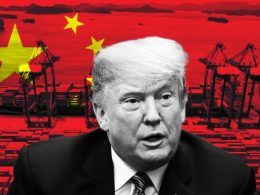Stay informed with free updates
Simply sign up to the Chinese business & finance myFT Digest — delivered directly to your inbox.
China has picked Saudi Arabia as the venue for its first sale of US dollar sovereign bonds in three years, underlining its backing for the oil-rich kingdom’s bid to become an investment hub.
China’s State Council, or cabinet, approved the issuance of up to $2bn in dollar debt in Riyadh next week, the country’s finance ministry said on Tuesday, with details to be announced later.
Beijing has traditionally issued US dollar bonds in Hong Kong. The choice of Saudi Arabia for this new issuance is symbolic of the deepening financial ties between the two countries.
Saudi crown prince Mohammed bin Salman wants Chinese investment to buttress his so-called Vision 2030 modernisation drive, designed to reduce its dependence on oil and project it on to the global stage.
The country is increasingly turning to its own international dollar bond sales to bankroll massive so-called “giga-projects”, and has been one of the biggest issuers in emerging markets this year.
China meanwhile has sought to secure major Saudi construction contracts after a property market collapse at home, while a Saudi solar boom has attracted Chinese companies that make panels and batteries.
Selling debt in Riyadh is “part of deepening ties with Saudi Arabia from the state level”, said a Beijing-based senior banker at a Chinese state-owned lender who is familiar with the bank’s loan book in the Middle East.
Although Russia overtook Saudi Arabia as Beijing’s main oil supplier last year, the kingdom still exports much of its crude to China, earning dollars that it can then park in financial assets.
“Given the increasing oil export to China from Saudi, Saudi can put the dollars earned into dollar denominated Chinese sovereign bond,” the banker added.
Trillions of dollars in international reserves and current rock-bottom interest rates for borrowing renminbi at home mean that foreign currency bond sales are a minor part of China’s government funding.
But such bonds are an easier way for global investors to buy the country’s sovereign debt than debt issued domestically. They can also provide a benchmark for other issuers.
“Issuance of dollar debt itself has little meaning” for the Chinese finance ministry, said a Shanghai-based executive at a European bank. “But it has a price-setting effect on all of the other Chinese issuers for dollar bonds.”
In August, the Saudi Public Investment Fund — the kingdom’s sovereign wealth vehicle, which is reorienting to investing at home — signed deals worth $50bn with Chinese banks to promote “two-way capital flows through both debt and equity”.
Ewpartners, a Saudi-Chinese private equity firm backed by ecommerce giant Alibaba and the PIF, said in October that it wanted to set up a special economic zone in Riyadh to attract Chinese manufacturing investment.
China broke its three-year hiatus from international bond markets in September with the sale of €2bn in euro-denominated debt in Paris, just before the European Central Bank cut interest rates that month.
Source link









